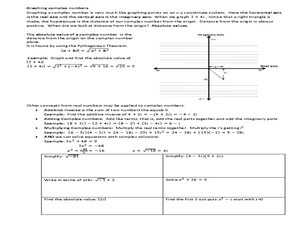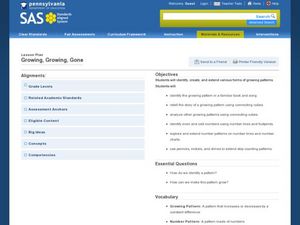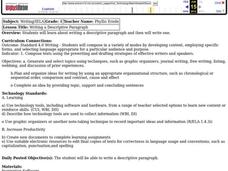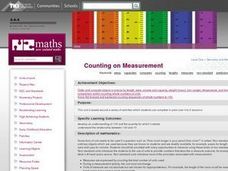Curated OER
ESL: Around Town Matching
Tiny pictures of buildings found around town can be matched with their names in this exercise for beginning English Learners. Indefinite articles are included with vocabulary; nice way to reinforce the "a/an" rule. Pictures are quite...
Curated OER
100th Day Celebration
Students celebrate the 100th day of school with a variety of math and language arts activities based on the number 100. They make books, count objects, and draw their predictions about life 100 years from now. They also estimate the time...
Curated OER
Frost Depth Study
Students complete activities to study the frost and frost depth. In this frost study lesson, students use frost tubes to study and measure the frost at their school. Students measure the frost in the tube and enter their data online to...
Curated OER
Scientific Notation
In this scientific notation instructional activity, students change numbers from standard form to scientific notation and change numbers from scientific notation to standard form. This one-page instructional activity contain 15 problems.
Curated OER
Complex Number
In this algebra instructional activity, students identify the vertex of a quadratic functions. They identify complex numbers. There are 6 questions.
Curated OER
Math: It's About Patterns
Fourth graders discover place value patterns through various games and readings and record their findings in journals. In pairs, they use manipulatives such as place value tents and digit cards to drill and practice writing numbers in...
Curated OER
Exponents - Week 1
In this exponent worksheet, students add, subtract, multiply and divide exponents. They solve problems containing negative exponents, fractional exponents, and polynomials. This two-page worksheet contains eight problems.
Curated OER
Place Value: Ones, Tens and Hundreds: Worksheet 3
In this place value instructional activity, students write numbers in standard form, write the place of underlined digits and answer one related word problem.
Virginia Department of Education
Exploring 3-D Geometry
Take young mathematicians on an exploration of the world of 3-D geometry with this seven-lesson unit. After first defining the terms perimeter, area, and volume and how they apply to the real world, students continue on to learn the...
Curated OER
It's Greek To Me!
For this language lesson, scholars use Greek root meanings to determine the meaning of words. After being shown how Greek roots are used in many words, such as, photosynthesis, pairs are given two excellent black line masters embedded in...
Curated OER
Scientific Notation
In this algebra worksheet, 9th graders rewrite exponential numbers using scientific notation and condense the equations and expand using the standard form. There are 6 word problems applying the use of scientific notations.
Curated OER
Money Bags
Third graders explore different combinations of coins that can be used for specified amounts of money using paper money and tree diagrams. They write money amounts in different forms. Groups utilize a tree diagram imbedded in this lesson...
Curated OER
Double Serving Lesson Plan
First graders add doubles numbers in number sentences. For this doubles numbers lesson plan, 1st graders list things that come in pairs, create doubles addition sentences, and solve riddles with doubles.
Curated OER
Enjoyable Assessments
First graders participate in two place value games for review. In groups, they work together to assess themselves before their test over place values. They review any questions they have before their assessment.
Curated OER
Growing, Growing, Gone
Budding mathematicians identify growing patterns in numbers and songs then create their own patterns. They look at number patterns and language patterns and then create their own using money and footprints.
Curated OER
Writing Descriptive Paragraphs
Show a Powerpoint presentation about descriptive writing. Fourth graders brainstorm a list of writing topics and place them in graphic organizers. Then they write their own paragraphs describing topics of their choice and create...
Google
The Law of Large Numbers and Probability
Learners investigate why theoretical probability doesn't always match reality. The activity involves using Python 2.7 (or Sage) to set up a Bernoulli Trial. It also involves setting up a spreadsheet to simulate the Birthday Paradox....
Curriculum Corner
Splashes of Spring Math Centers
Spring into math practice with a set of resources that taps into a variety of math practice. Skills include matching expressions to their definitions, a place value sorting activity, three multiplication and division games, several...
University of California
You Are What You Eat: Testing for Organic Compounds in Foods
We have all heard that we are what you eat, but what are we eating? An informative lesson opens with a discussion of the foods pupils have recently eaten. Then, young scientists perform four experiments on seven different foods to...
Scholastic
Study Jams! Relate Addition & Subtraction
Understanding the inverse relationship between addition and subtraction is essential for developing fluency in young mathematicians. Zoe and RJ explain how three numbers can form fact families that make two addition and two subtraction...
Curated OER
Clouds in a Jar
Fifth graders create a cloud jar so that they can observe that clouds are made of tiny droplets of water. After observing the cloud jar, they record their observations on a worksheet in written form explaining that clouds are made of...
Curated OER
Counting on Measurement
First graders explore measurement. They measure by counting non-standard units. Students use a variety of non-standard units to predict and measure volume of various containers using rice.
Curated OER
Fractions: Parts of a Set
Students identify, model, and label simple fractions. They describe and define them as equal parts of a whole, a region and a set. Students use words to describe fractions. They use manipulatives to explore the many different fractions.
Curated OER
Number Lines
Third graders create a human number line. In this number lines lesson, 3rd graders review how to create a number line and its purpose. Students form a human number line by drawing a number from a bag and positioning themselves on a line.

























